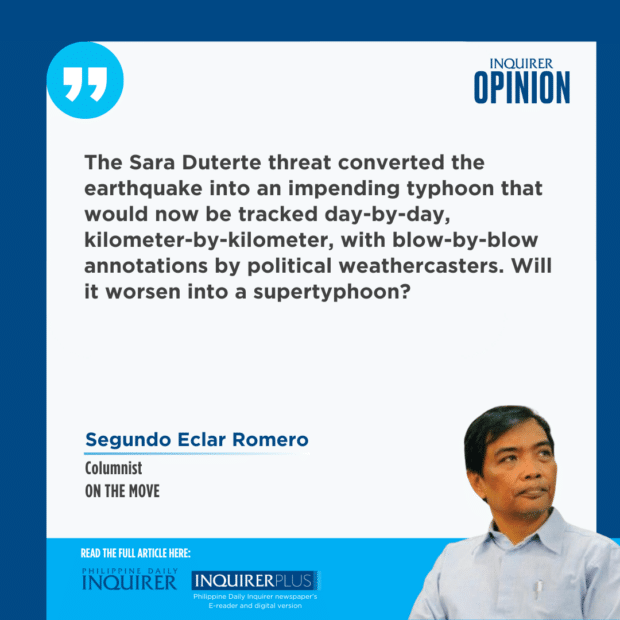‘Assassination watch’ in the Philippines

The threats publicly aired by Vice President Sara Duterte have created a novel phase in the public appreciation of political assassinations. Whereas, people exploded in extreme emotion upon the news of high-profile assassinations like that of Benigno Aquino Jr., and the localized anguish of political assassinations of lesser officials, Sara Duterte has thrust the country into a novel season of “assassination watch.” Seldom have would-be assassins, both perpetrators and instigators, so openly advertised their move, with no quibble room for doubt, as VP Sara did when she emphasized the threat was “no joke, no joke.”
This is new political telenovela territory. And Duterte has made sure this is a telenovela that will be followed throughout the world. The specific wording of her threat, delivered in a video that showed her partially in a darkened room, gave her threat an eerie, goosepimple-raising spectacle that quickly rippled around the world. Only in the Philippines!
Political assassinations used to happen without much inkling or anticipation, like earthquakes. But the Sara Duterte threat converted the earthquake into an impending typhoon that would now be tracked day-by-day, kilometer-by-kilometer, with blow-by-blow annotations by political weathercasters. Will it worsen into a supertyphoon? Or will it weaken and dissipate altogether? Political assassinations have become a before-and-after national topic, where before it was always after the fact.
Article continues after this advertisementSara Duterte has also created a macabre package deal—kill one, take four. If she dies, the President, the First Lady, and the Speaker of the House will also die. The instructions to the assassin, according to her, is that s/he should not stop until all three are killed. This is, in nuclear war parlance, called a “failsafe” condition, because there is no way Sara Duterte can countermand the order, in her own words, “from the grave.”
The contract that Sara Duterte has drawn is unique. It is inclusive and participatory because it encourages a myriad of perpetrators and instigators to now rush to initiate the process of eliminating her which will be blamed on the Marcos family.
Unfortunately, there is no more whiff even of imagined honor or patriotism behind political assassinations. It has become just a matter of political ambition and money. How different the motivation was when Julio Guillen, on the eve of the plebiscite on the Parity Rights Amendment to the 1935 Constitution, threw a grenade to kill President Manuel Roxas at Plaza Miranda on March 10, 1947, because he championed the amendment which Guillen opposed. Guillen did it “for the sake of a Free Philippines.” The grenade killed one person and injured others. Roxas survived. Guillen died on the electric chair in 1950.
Article continues after this advertisementFerdinand E. Marcos Sr. was less salutary in his motive but at least he didn’t hire an assassin to take down his father’s political rival, Julio Nalundasan. Marcos Sr. did it DIY, using a rifle from the UP ROTC armory that was traceable to him.
To better appreciate this Filipino political assassination teleserye, I recommend you read the article “Killing Politicians in the Philippines: Who, Where, When, and Why” by Peter Kreuzer (Peace Research Institute Frankfurt (https://bit.ly/3D68AcA). The article provides an in-depth analysis of the targeted killings of politicians in the Philippines, focusing on the patterns, perpetrators, and underlying causes of such violence. Here are some points he makes:
The Philippines experiences a high incidence of fatal violence against politicians, comparable to countries like South Africa, Mexico, Colombia, and Brazil. Over the past 15 years, approximately 70 politicians have been killed annually, with numbers exceeding 100 deaths per year in recent times. Local politicians are predominantly targeted, especially at the barangay (village) level. Vice mayors and mayors face the highest risk of assassination.
While significant variations exist between neighboring local government units in levels of violence, the initial phase of former president Rodrigo Duterte’s anti-drug campaign led to a nationwide surge in killings. The perpetrators are typically contract killers hired to execute these assassinations. The individuals who commission these killings often remain unidentified and enjoy near-total impunity. The primary motive for assassinations is political rivalry, with adversaries eliminating opponents to secure or maintain political positions and the associated benefits.
Political assassinations have adversely impacted governance, yet on occasion, they have opened the pathway to transformative change, as in the assassination of Benigno S. Aquino Jr. This teleserye is open-ended and may take time, so have your Piattos on hand for this exciting assassination watch.
—————-
doyromero@gmail.com
















